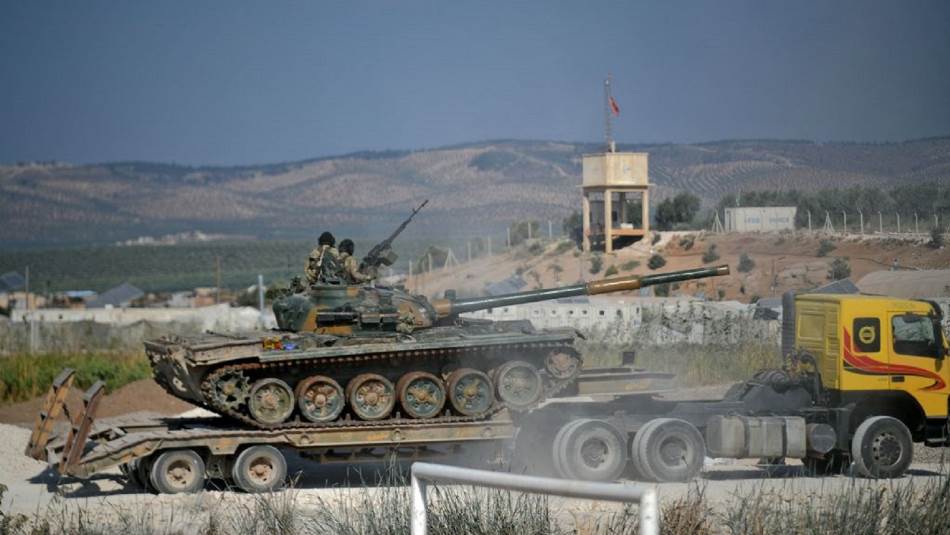There have been talks of suspending the work of the agreement signed between the Third Corps– the largest formation of the National Army in the countryside of Aleppo– and the Headquarters for Tahrir al-Sham (HTS), and the partial withdrawal of HTS from the Afrin area towards Idleb after the escalation of fighting between the two parties on the outskirts of Western Azaz and the intervention of the Turkish army. However, military sources revealed to Al-Modon the possibility of its application during the coming period under Turkish auspices and with the participation of the Thaeron Liberation Authority, which entered some of its formations as conflict resolution forces. What are the unannounced terms included in the agreement between the two parties?
Civil Administration
The agreement provides for the transfer of HTS of its experience in the civil administration in Idleb to the areas of operations of the Euphrates Shield and Olive Branch in the countryside of Aleppo. This is so that its salvation government will manage local councils throughout the region with changes in its structure, members and work programs and hand over the management of various service sectors, such as education, health, municipal services, and others. This comes in addition to establishing branches of other service directorates, such as those in Idlib, managing camps for displaced persons, relief, fuel and media.
Economy
In the economic sector, HTS is supposed to manage the economic issue through its directorates and ministries, including internal crossings (crossings with the Syrian regime and the SDF) and the four border crossings with Turkey (Jarablus, al-R’i, Bab al-Salama and Hammam), the management of the sectors of agriculture, industrial zones and trade, and various sectors of the economic issue. In addition, the financial fund is in possession of the commission’s leader, Abu Mohammed al-Julani, who will work to disburse the funds to the civil administration, and allocate part of these funds to the military and security issues. External support funds and monthly salaries for faction fighters will be poured into the same financial fund.
Security and military issues
It was also agreed that HTS would supervise the security members: the military, civil and traffic police, and their direct subordination to its General Security Agency. The security work includes supervision of checkpoints as well, and the agreement includes the supervision of its judicial bodies affiliated to the Salvation Government over the civil and military judiciary and prison administration. No military faction will be able to run its own prisons or carry out arrests in civilian or military cases, nor will the economic offices of the factions be abolished, as they will naturally lose sources of income because the agreement stipulates that they will lose crossings and smuggling operations, i.e. the work of the factions will be limited only to military affairs.
In the military issue, the agreement includes the establishment of a unified military operations room and a single military command that includes all military formations, including those of the military wing of HTS. This will be a prelude to activating the role of the Ministry of Defense by assuming responsibility for managing the entire military issue, organizing military brigades, and managing the training, affiliation, technical, administrative and financial affairs sectors.
Role of the Coalition
The agreement did not stipulate the abolition of the role of the Syrian Interim Government and the opposition National Coalition. The agreement will be implemented in stages, so that the Interim and the Coalition will remain as a political cover until the successful merger of the interim ministries with the ministries of the Salvation Government in Idleb, and the full implementation of the terms of the agreement regarding the civil and military administrations. The merger of the two governments is supposed to be the result of a new government representing the entire opposition-held area of northwestern Syria under the political cover that the coalition will provide, which will witness a significant expansion to include new figures from inside Syria specifically.
The agreement signed between the Third Corps and HTS will necessarily mean the end of direct Turkish administration in the Euphrates Shield and Olive Branch areas. This shift is not opposed by Turkey, which actually wants the emergence of a local administration in northwestern Syria capable of providing services and managing the military and security sectors, and whose role is only supervisory and supportive.
This article was edited and translated by The Syrian Observer. The Syrian Observer has not verified the content of this story. Responsibility for the information and views set out in this article lies entirely with the author.


